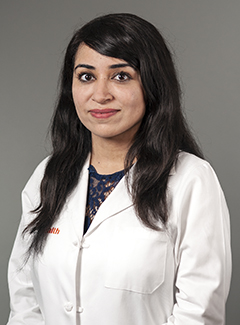
Certified as a Level 4 epilepsy center by the National Association of Epilepsy Centers, UVA’s comprehensive epilepsy program offers complex neurodiagnostic monitoring, extensive medical, neuropsychological and psychosocial treatment, as well a broad range of surgical options. Neurologist Ifrah Zawar, MD, joined this team of skilled specialists in July 2021.
Ifrah Zawar, MD
Medical School: Aga Khan University
Residency: Neurology; Cleveland Clinic
Fellowship: Epilepsy; Cleveland Clinic
Where did you complete your medical training?
I attended medical school in Pakistan before moving to the U.S. in 2014. I, then, completed my neurology residency and epilepsy fellowship at Cleveland Clinic in Ohio. Once I finished this training, I came to UVA.
Why did you choose to specialize in epilepsy?
During my residency, I was intrigued by how seizure semiology can help localize epileptic zones and can so accurately pinpoint a particular area in the brain, how EEG can capture subtle microscopic structural changes in the brain that even the most refined imaging studies cannot, how seizure control can totally change a patient’s life and how adequate seizure control can largely prevent sudden unexpected deaths in epilepsy.
Epilepsy is a public health problem. It can be a devastating disease for many patients, and can have lifelong consequences. Many patients who suffer from epilepsy end up on disability. The ability to care for these patients and help them overcome the challenges that come with this disease is one of the main reasons I have chosen to pursue this specialty.
What are your specific areas of expertise?
One of my primary areas of expertise within the field is epilepsy surgery, which has the potential to completely turn around the lives of those with refractory epilepsy. I trained at Cleveland Clinic, which is one of world’s largest epilepsy surgical centers. So my training has equipped me to treat some of these extremely complicated patients whose seizures are not controlled by medications alone, and who may require surgery. Managing epilepsy in these patients can be challenging and difficult, but if we can cure them with surgery, it’s very fulfilling to see them recover.
How would you describe your approach to patient care?
My hope and goal is to cure patients of their epilepsy if possible, and I strive to provide world-class care in order to achieve that goal. Epilepsy can be a lifelong condition that can have an impact on every aspect of a patient’s life. My goal is to provide continuity of care and to develop a relationship with my patients over time.
What is unique about epilepsy care at UVA?
UVA provides comprehensive, advanced care for epilepsy patients. An accurate diagnosis of the disease is very important. Patients who present with seizures may not always have epilepsy. UVA has all of the latest technology — EEG and MRIs and functional neuro-imaging techniques — to help assess whether patients are at risk for recurrent seizures and to establish an epilepsy diagnosis. Pinpointing the exact type of epilepsy helps determine the best approach to patient care. Once epilepsy diagnosis has been established, we typically proceed with anti-seizure medications. Over the past several decades, there have been many new anti-seizure medications that have been approved by the FDA for the treatment of epilepsy. We try different medications to help find one or a combination of medications that work best for the individual patient with minimal side effects. We then monitor patients over time and if they’re not responding to medication, surgery may be considered as the next step.
Will you be involved in research at UVA?
I am an active part of research being conducted at UVA, and I have a strong research mentorship. My research focus at the moment is dementia and epilepsy. These are both public health concerns. A lot of elderly patients suffer from dementia, and epilepsy diagnoses in older adults are also going up. An increasing number of studies show that outcomes for patients who have both conditions tend to be worse compared to people who have one condition, so it is a research area in need of a lot of attention.
How do you prefer to communicate with referring providers?
Epilepsy patients require collaborative care, so I am committed to working with referring providers to ensure everyone on the care team is well-informed on the patient’s status and treatment plan.
To refer a patient to UVA Neurology, call UVA Physician Direct at 800.552.3723.